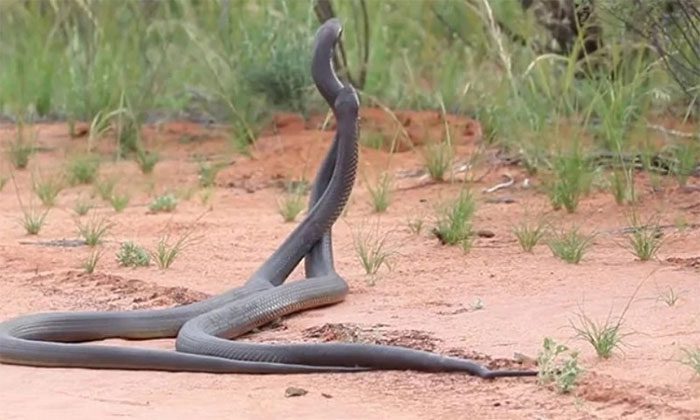Two male mamba snakes exhausted after a battle for a mate were captured by a snake expert and taken away from residential areas.
A fierce battle between two highly venomous black mamba snakes. (Video: Nick Evans)
Two large black mamba snakes engaged in a fierce battle in the yard of a resident in Queensland, South Africa. They fought for over 30 minutes in an effort to pin each other down. The larger snake, measuring 2.6 meters, attempted to constrict the smaller adversary measuring 2.5 meters, as described by snake expert Nick Evans on July 3. This action was repeated three times before the smaller snake surrendered and fled. Evans later captured the exhausted pair after their fight and released them far from human habitation. He noted that they were likely competing for a female snake during the mating season.
The black mamba (Dendroaspis polylepis) does not bite during battles; instead, they wrestle until one concedes. This species is among the most venomous on Earth and is considered one of the deadliest in Africa, inhabiting the eastern and southern parts of the continent, according to John Dunbar, a postdoctoral researcher at the University of Galway, Ireland.

The behavior in the video is called “plaiting combat”.
The venom of the black mamba targets the connection between the nerves and muscles of its prey. The black mamba can quickly immobilize and kill a person within 20 minutes. However, they are shy creatures and only attack humans when they feel threatened.
Dunbar noted that the behavior showcased in the video is called “plaiting combat”, which occurs only in the presence of a female snake. The name comes from the way black mambas intertwine their bodies to gain the upper hand and win a mate. Their goal is to prevail by forcing their rival to submit.
Snakes also possess immunity to their own venom. Exposure to venom during mating or feeding can trigger a mild immune response, whereby the snake’s antibodies neutralize the toxins. This antibody helps protect them when bitten by others of the same species. However, snakes are not completely immune and can sometimes die from venom if exposed to a high dose from a conspecific.


















































